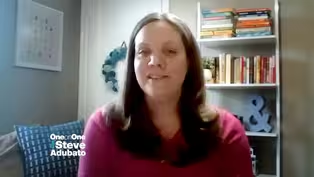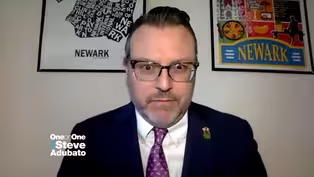One-on-One
Better Dental Health Options for People with Disabilities
Clip: Season 2024 Episode 2712 | 10m 32sVideo has Closed Captions
Better Dental Health Options for People with Disabilities
Dr. Keith Libou, Chief Clinical Officer, Delta Dental NJ & CT, and Dr. Elisa J. Velazquez, President-Elect of New Jersey Dental Association, join Steve Adubato to discuss the lack of affordable and quality dental health options for people with intellectual and developmental disabilities.
Problems playing video? | Closed Captioning Feedback
Problems playing video? | Closed Captioning Feedback
One-on-One is a local public television program presented by NJ PBS
One-on-One
Better Dental Health Options for People with Disabilities
Clip: Season 2024 Episode 2712 | 10m 32sVideo has Closed Captions
Dr. Keith Libou, Chief Clinical Officer, Delta Dental NJ & CT, and Dr. Elisa J. Velazquez, President-Elect of New Jersey Dental Association, join Steve Adubato to discuss the lack of affordable and quality dental health options for people with intellectual and developmental disabilities.
Problems playing video? | Closed Captioning Feedback
How to Watch One-on-One
One-on-One is available to stream on pbs.org and the free PBS App, available on iPhone, Apple TV, Android TV, Android smartphones, Amazon Fire TV, Amazon Fire Tablet, Roku, Samsung Smart TV, and Vizio.
Providing Support for PBS.org
Learn Moreabout PBS online sponsorship(upbeat music) - We're now joined by Dr. Keith Libou, who's Chief Clinical Officer of Delta Dental, New Jersey and Connecticut.
And also Dr. Elisa Velasquez, who is President elect of the New Jersey Dental Association.
Great to have you both with US doctors.
- Thank you for having us.
- Great to be here.
- And thank you.
And let me just disclose that Delta Dental is an underwriter of our healthcare programming.
Dr. Keith, let me ask you this.
There are 6.5 million people in the US with intellectual or developmental disabilities.
The reason we're doing this segment is because a high percentage of those folks do not have access to quality accessible oral health.
Why don't they have access?
And what are the implications of that?
Please, doctor, - We looked at the problem and through our work with Special Olympics and talking with dentists and talking with the pediatric dental specialists, we became aware of the fact that there are just a number of hurdles that this population faces.
You know, not only is it a question of finding the right dentists who could provide their care, but there are financial barriers.
There are financial barriers that we to address.
- But Dr. Velasquez, let's talk about the implications of this.
I mean, so many of us take our oral health for granted, which is a whole, not even a different subject, but it's accessible to us.
It's affordable for us, we can do, but we're talking about a population that it's much more challenging for.
But what are the implications of not getting that oral care, Dr. Velasquez?
- Yeah, great question, Steve.
As we know, oral health is for sure part of overall health, and anyone who isn't going regularly to the dentist can have implications.
But certainly the vulnerable populations are way more susceptible to problems that can snowball.
- Such as.
- Any medical issues.
So, for example, a child that's nonverbal, autistic patient, perhaps that doesn't go to the dentist, may have a dental problem that their families weren't aware of, and it could turn into a facial cellulitis, for example, where they have to be hospitalized to have that treated.
So things can become exacerbated very quickly.
So we're all about prevention.
So that's what the game should all be about.
- You know, Dr. Libou, listening to your colleague, one of the things that strikes me is the question of access to dentists, to professionals in the field, to doctors in the field.
What about training dentists to deal directly with this very large and significant population with intellectual and developmental challenges, disabilities?
How the heck do we train clinicians to help those who are dealing with these issues Libou?
- Steve, the dental school curriculum give a very good basic education how dental students need to work with patients that have various special needs.
Additionally, as dentists are out there practicing, many of them pick up the skills just through life, through working with their patients.
And they learn how to do that from working with their existing patients.
Sometimes it's a life experience they've had with a family member.
Other times it could be continuing education.
And then we have the pediatric dentists like Dr. Velasquez, who go through many years of additional specialty training to work with the more complex cases.
- Along those lines, Dr. Velasquez, what are the more, as your colleague talks about the more complex cases, are there any specific challenges or ways you need to, as a dentist, deal with someone with certain challenges that is different than someone who doesn't have those challenges please, doctor?
- Yeah.
So as Dr Libou said, we are all trained in dental school.
I'm an alumni of the Rutgers Dental School, and it is part of the curriculum.
And then as you specialize, you find your areas of interest.
So as a pediatric dentist, it is a big portion of our education.
We do an additional two to three years of residency, and then we work with a variety of special needs patients.
I'm in practice over 20 years, staff dentist at Children's Specialized Hospital.
And so for example, I was there this morning, for example, I have many patients in wheelchairs, on ventilators.
And you have to, one, feel comfortable and able to handle their medical complexities and potential medical emergencies that may arise.
But sometimes you have to be ready to handle patients that need additional services to have the dental work completed.
For example, we often have to sedate kids.
So in New Jersey, you have to have a permit to be able to sedate children.
- That's right.
- Requires additional continuing education.
So that's something as a board certified pediatric dentist that I make sure I complete.
- You know, Dr. Libou, it's interesting listening Dr. Velasquez, 'cause you mentioned early on Special Olympics and I've been honored the last several years to to host a fundraiser.
It's a golf outing raising dollars for Special Olympics that's hosted by Delta Dental.
And I've been honored to be a part of that effort to raise money for such a good cause.
What is the role in Special Olympics in this whole initiative, Dr. Libou?
- The role of Special Olympics?
Well, yeah, we work very closely with them and we were involved in clinics to bring access to the athletes, to make care more accessible.
And they've just been a great, a great source for connecting us with doctors in New Jersey who have skill sets, who have experience working with these individuals and also as sort of a consultative source to help us define our new benefits.
- Dr. Velazquez, lemme try this.
So you were saying before that oral health is so much connected to other health and medical issues for us, help folks understand by giving another concrete example, whether it's dealing with someone who has developmental disabilities, intellectual disabilities, or those of us who may not, but may take oral health for granted.
Help us understand with one concrete example that if we're not taking care of our oral health, that there's a real specific problematic health related issue that could be a byproduct of not taking care of oral health.
Please Dr. Velazquez.
- Yes, sure.
Again, great question.
So for example, a patient with Down Syndrome often have comorbidities, may have heart conditions, may have thyroid conditions, and if they're having dental problems, often they're related to dental cavities.
And we have to remember that's a bacterial infection.
So then that bacteria is harboring around on the teeth and can be negative consequences on the heart valves.
So it's all all related.
- Sorry to interrupt.
Does it get into the bloodstream?
Is that we're concerned about?
- Yes, exactly, exactly.
So we would have to know the medical condition of that specific patient that has that syndrome and understand the extent of their cardiac condition, for example.
- But along those lines.
- That would be related to children, adults, anyone.
- But again, if you're dealing with someone who's got intellectual or developmental disabilities, it's one thing to talk about a child in that situation and help getting information from their parent.
But if someone is older and may not have those caring caregivers, if you will, that's really challenging.
Is it not Dr. Velasquez?
- Yes, for sure.
So if the dental care is frankly, non-existent or the patient is having just irregular visits just for emergencies and whatnot, their mouth is unhealthy and then it can cause issues on the medical side.
When their immune system is compromised for X, Y, or Z, then the dental problem can basically blow up on them and become an issue, especially on an intellectually challenged patient that can't verbalize what they're feeling or experiencing.
And we don't know until there's a physical sign of infection.
And that's the shame of it.
- Dr. Velazquez, Dr. Libou, such important information.
So many people with intellectual or developmental disabilities who are not being, getting the care, the oral health care they need.
Important subject.
We will not leave this alone.
We'll follow up again.
Thank you both, doctor, we appreciate it.
- Thank you for highlighting this important issue.
We appreciate it.
- Thank you Steve.
- You got it, stay with us.
We'll be right back.
- [Narrator] One-On-One with Steve Adubato is a production of the Caucus Educational Corporation.
Celebrating 30 years in public broadcasting.
Funding has been provided by New Jersey Institute of Technology.
PNC Foundation.
The North Ward Center.
The New Jersey Education Association.
RWJBarnabas Health.
Let’s be healthy together.
New Jersey Sharing Network.
The Turrell Fund, a foundation serving children.
The Healthcare Foundation of New Jersey.
And by NJM Insurance Group.
Promotional support provided by NJ.Com.
And by ROI-NJ.
- I’m very grateful that I’m still here.
- That’s me and my daughter when we went to celebrate our first anniversary.
- With a new kidney I have strength.
- They gave me a new lease on life.
- I’m still going everywhere and exploring new places.
- Nobody thought I was going to be here, nobody.
- I look forward to getting older with my wife, that’s possible now.
- [Narrator] We’re transforming lives through innovative kidney treatments, living donor programs, and world renowned care at two of New Jersey’s premiere hospitals.
- They gave me my normal life back.
It’s a blessing.
- [Narrator] RWJBarnabas Health.
Let’s be healthy together.
Audiobooks and Their Impact on Literacy and Comprehension
Video has Closed Captions
Clip: S2024 Ep2712 | 8m 19s | Audiobooks and Their Impact on Literacy and Comprehension (8m 19s)
Editor of TAPinto Newark Talks About Local Media and Crime
Video has Closed Captions
Clip: S2024 Ep2712 | 9m 17s | Editor of TAPinto Newark Talks About Local Media and Crime (9m 17s)
Providing Support for PBS.org
Learn Moreabout PBS online sponsorship
- News and Public Affairs

Top journalists deliver compelling original analysis of the hour's headlines.

- News and Public Affairs

FRONTLINE is investigative journalism that questions, explains and changes our world.












Support for PBS provided by:
One-on-One is a local public television program presented by NJ PBS

